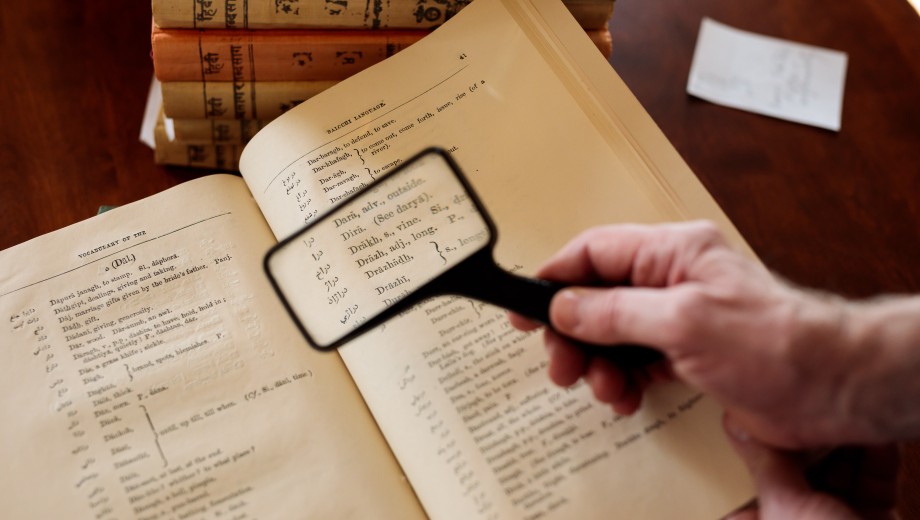The Digital Dictionaries of South Asia (DDSA), an online reference resource currently representing 28 languages spoken by more than 1.9 billion people in South Asia and the Middle East, is undergoing a three-year expansion funded by the US Department of Education in 2020. From Assamese to Pali to Urdu, DDSA is a free—and increasingly popular—tool for scholars, diplomats, businesspeople, and casual users worldwide.
According to DDSA director James Nye, the Library’s former bibliographer for Southern Asia, the expansion will bring at least eight new dictionaries, more flexible search queries, recordings of pronunciations by native speakers, and an improved mobile experience. Nye has been instrumental in garnering resources for the UChicago–based project, including multiple rounds of funding since its creation as a partnership between the University of Chicago, Columbia University, and a South Asia studies consortium in North Carolina in 1999.
Although these upgrades are still in progress, DDSA has already seen a 20 percent increase in traffic—from about 7 million annual searches just before the expansion to about 8.7 million today—with more and more queries now coming from phones. Nye credits the increase largely to improved responsive design and to the availability of mobile apps for iOS and Android, including offline access using locally saved versions of the dictionaries.
“My goal as the developer is to make these dictionaries as accessible as possible to as wide an audience as possible,” says programmer Charles Cooney, AM’97, PhD’04 (Comparative Literature), noting that more than half of DDSA’s users are in South Asia, with many lacking access to a desktop or laptop computer or even a stable internet connection. Cooney, also a developer for the longstanding French-language digital resource ARTFL, says his background in classics and French poetry has attuned him to the great value of reference works.
Sanskrit scholar Gary Tubb, the Anupama and Guru Ramakrishnan Professor and chair of South Asian Languages and Civilizations, says that language students in SALC now rely heavily on digital dictionaries and that DDSA was a crucial resource for SALC PhD students who couldn’t return to campus during the pandemic, including some who were stuck outside of the country.
Others use the dictionaries during family game night. The creators of the word puzzle game Sorkalam—described by Indian newspapers as “Tamil’s answer to Scrabble”—have favorably reviewed DDSA’s Tamil lexicon app, saying they recommend it to their players to resolve word challenges.
DDSA is a backbone for other learning resources, says Tyler Williams, an assistant professor in SALC who is creating a web-based interactive fiction game for learning the Hindi language that uses DDSA’s data. Tubb is also building on DDSA to develop a new digital resource for Prakrit, a group of ancient vernacular Indian languages not covered by the current round of federal funding. (A faculty grant from the Committee on Southern Asian Studies is funding the Prakrit project.)
“The creation of digital dictionaries for South Asian languages,” Williams says, “is changing research, pedagogy, and learning in ways that we are only beginning to understand.”

